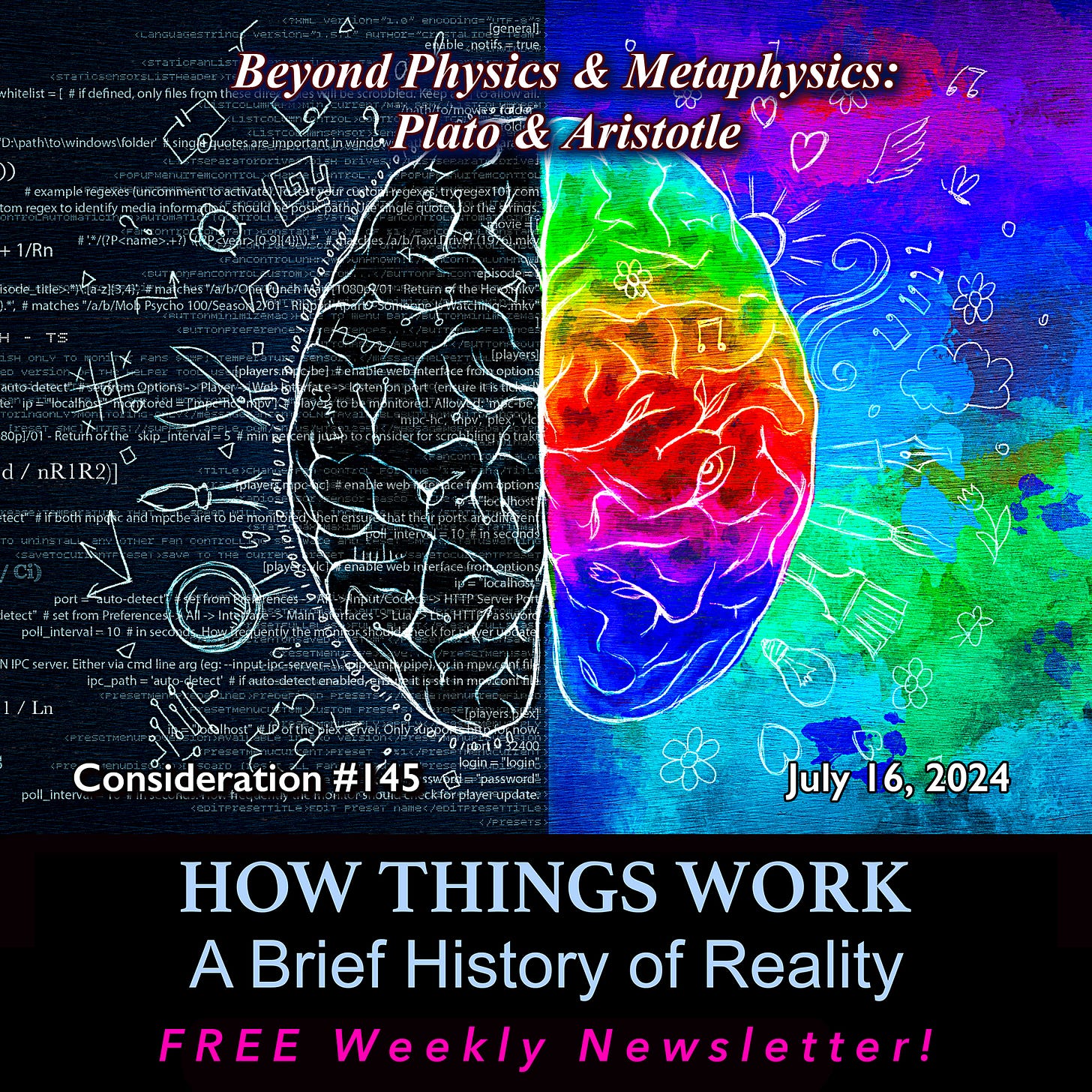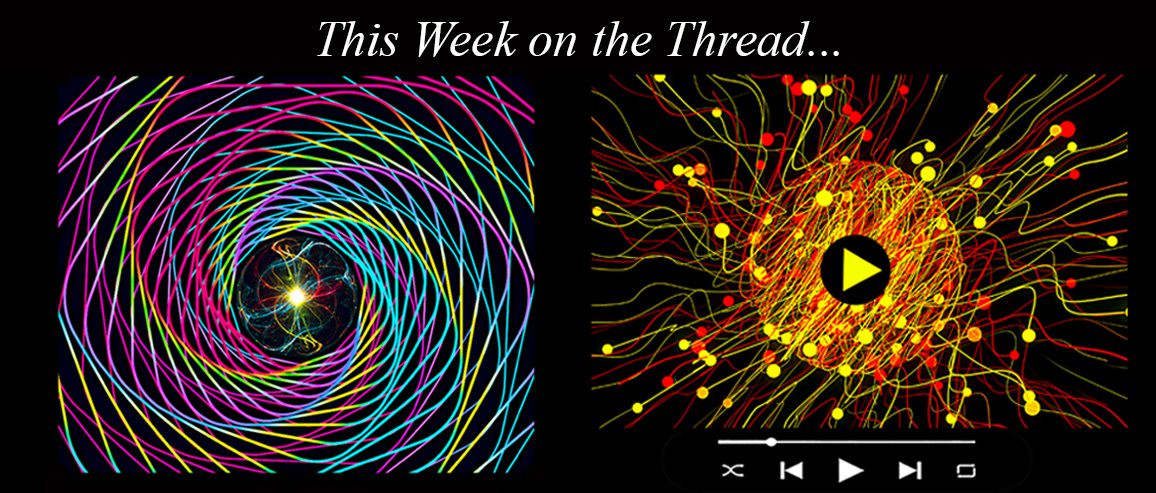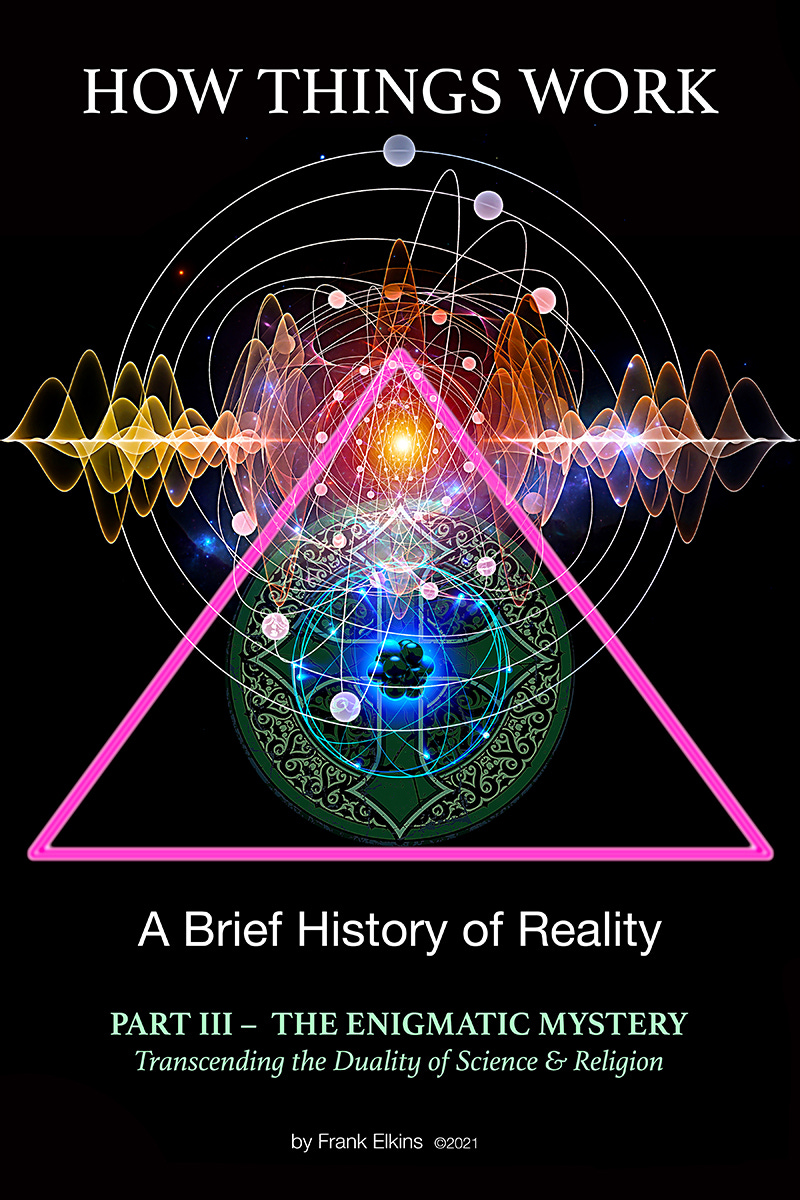BEYOND PHYSICS & METAPHYSICS: Plato & Aristotle
HOW THINGS WORK – CONSIDERATION #145
Be A Part of the Conversation!
Tuesday July 16, 2024
“To this there also belongs the faith in the possibility that the regulations valid for the world of existence are rational, that is, comprehensible to reason. I cannot conceive of a genuine scientist without that profound faith. The situation may be expressed by an image: science without religion is lame, religion without science is blind.”
– Albert Einstein (“Science and Religion,” 1941)
PREFACE
Welcome Everybody!
The same metaphysics that allowed philosophers to demonstrate the physical world through the rational abstract foundations of mathematics and science, were also the same metaphysics used to demonstrate the rational existence of spirit, or mind, manifested through the non-physical world of a priori knowledge. The world of the spirit, which included the possibility of God and an afterlife, was considered the very source of the human “reason” that made abstract possibilities such as mathematics and science accessible to the human mind. The metaphysics of theology was considered to be the highest philosophy by philosophers such as Plato and Aristotle.
“Plato’s concepts of the soul, and the eternal world of Forms, became the template for Heaven in rational Christian theology.”
Plato developed his Theory of Forms, which postulated a perfect eternal existence in which the quintessential essence, or soul, of all physical things existed forever. Plato’s concepts of the soul, and the eternal world of Forms, became the template for Heaven in rational Christian theology. In addition, Plato would serve as a model for much of the Catholic Church’s metaphysics related to Christianity.
CONSIDERATION #145 – Beyond Physics & Metaphysics: Plato & Aristotle
Plato firmly establishes the concept of rationalism with his considerations related to the “Realm of Forms.” Although a complete dimension of “mind,” it is the reservoir for all physical reality. The imperfect empirical world is a corrupted shadow of a perfect rational world that is the source of all physical manifestation.
“The ancient Greek philosopher Plato (420s-340s BCE) did a lot to change the way we think about the world, in everything from mathematics to ethics to logic. But perhaps one of his most influential contributions to philosophy was the Theory of Forms. In basic terms, Plato's Theory of Forms asserts that the physical world is not really the 'real' world; instead, ultimate reality exists beyond our physical world…
Plato's philosophy asserts that there are two realms: the physical realm and the spiritual realm. The physical realm is the material stuff we see and interact with on a daily basis; this physical realm is changing and imperfect, as we know all too well. The spiritual realm, however, exists beyond the physical realm. Plato calls this spiritual realm the Realm of Forms (also called the Realm of Ideas or Realm of Ideals). Plato's Theory of Forms asserts that the physical realm is only a shadow, or image, of the true reality of the Realm of Forms…
The Forms are abstract, perfect, unchanging concepts or ideals that transcend time and space; they exist in the Realm of Forms. Even though the Forms are abstract, that doesn't mean they are not real. In fact, the Forms are more 'real' than any individual physical objects.”
Study.com – The Theory of Forms by Plato
Aristotle continues Plato’s metaphysical questioning regarding the nature of reality and Being. Aristotle concludes that everything in the universe is in motion. The Being who set the universe into motion he called the Unmoved Mover. This Unmoved Mover, or God, initiated the universe and all the universal laws that apply to it. Once set into motion, the Unmoved Mover does not directly influence the physical world anymore; it serves as a continuous source of “Nous,” or Reason and Beauty, that Aristotle called “The Good.”
“Aristotle conceives of God as an unmoved mover, the primary cause responsible for the shapeliness of motion in the natural order, and as divine nous, the perfect actuality of thought thinking itself, which, as the epitome of substance, exercises its influence on natural beings as their final cause. These two aspects of God reflect the two defining aspects of Classical Greek Philosophy: the experience of the intelligibility of the natural order and the search for the first principle(s) responsible for its intelligibility, on the one hand, and the experience of nous both as the capacity to behold nature’s intelligibility and as the source of order in the human soul, soul itself being a source of shapely motion in the natural order.”
– R. Michael Olson, Aristotle on God: Divine Nous as Unmoved Mover
Therefore, the early Greek philosophers proposed an orderly reality based on reason that included both physical and non-physical aspects. The Catholic Church would eventually utilize this metaphysics to create the theology and dogma of the Church, including the existence of God in the doctrine of the Logos and the Holy Trinity. Science would utilize this same metaphysics to prove the existence of theoretical abstract entities, such as atoms, composed of three theoretical parts: proton, neutron, and electron.
The Greeks had unleashed Western Civilization from the inherent restrictions of dualism. The ability to recognize and balance duality with a third factor, generated from reason, transformed Western Culture and the world.
POSTSCRIPT
The Catholic Church became not only the single source of spirituality in the West; it also became the single source for higher education in the West. This means that essentially all early scientists were educated in the logic and reason of the Catholic Church. Nicolaus Copernicus (heliocentrism), Rene Descartes (the scientific method), Jean-Baptiste Lamarck (early theory of evolution), Gregor Mendel (genetics), and Georges Lemaitre (early Big Bang theory), were all by-products of Roman Catholic scholarship.
“…the schism between science and religion was one of politics and power, not metaphysics.”
The original schism between religion and science was not based on metaphysics; it was based on authority. Essentially, the church wanted authority over science. However, being an empirical discipline, it made no sense for the church to have such authority from a “scientific” perspective. Ultimately, science wanted to establish the “truth” about God’s influence in the empirical world and the church was not God. Science was willing to yield authority to the Church in questions related to rational theology, however the Church was unwilling to yield empirical authority to science. In essence, the schism between science and religion was one of politics and power, not metaphysics.
“…first we must re-establish the metaphysical link between science and religion that has led us to the manifestation of Artificial Intelligence.”
There is a level of reality beyond recognition, and even understanding, that exceeds both the physics and metaphysics of physical and nonphysical reality. To truly move beyond dualism, the opposites of physical (empirical) and nonphysical (rational) reality must be experienced simultaneously; adding a new quantum perspective to our understanding of reality. In Part III, The Enigmatic Mystery, the underlying transcendental mystery of Science and Religion are examined.
However, first we must reconsider the metaphysical links between science and religion that have led us to the manifestation of Artificial Intelligence. How did the schism between science and religion lead us to our current perception and manifestation of reality?
Next week we begin to consider the establishment of Christianity into the empirical world…
Expand the Conversation by Upgrading to “Reality by a Thread!”
Excerpt From This Week’s “Untangling the Knots of Reality” Podcast:
• UNTANGLING THE KNOTS OF REALITY: Podcast #104 – “Untangling Gravitational Waves”
“What are Gravitational Waves, and how do they impact space-time?” “How do Black Holes create Gravitational Waves?” “Why did Einstein remain skeptical about the possibility of Gravitational Waves his entire life?” “How do Gravitational Waves affect the memory of space-time?” “How do Einstein’s theories of relativity reveal a universe considerably more complex and interrelated than first thought?” These are some of the knots we will attempt to untangle in this week’s podcast. That’s a lot of Gravitational Waves for one podcast! So, let’s get started…”
• REALITY BY A THREAD: “Quantum Empirical Dictums” (Excerpt)
“This universal quantum-rational understanding of How Things Work is a prerequisite for implementing the appropriate empirical applications of this quantum-rational knowledge. The following Quantum-Empirical Dictums reflect an empirical understanding of this rational knowledge. They serve as a roadmap for establishing a foundation of coexistence and cooperation between any, and all, self-aware rational beings. Including human beings and Artificial Intelligence.”
• FREE PDF DOWNLOADS of Book IV: “The Cosmic Symphony – Overtones of String Theory” plus other Free Books, Discounts and Benefits. Also Gain Complete Access to all Previous Podcasts and Threads!
UPGRADE NOW!
Book III Now Available! "The Enigmatic Mystery – Transcending the Duality of Science & Religion"
We are now beginning to understand that opposites, like waves and particles, are essentially two ways of looking at the same thing. That “thing” is the mystery. It is now becoming more and more apparent that the mystery science is seeking to understand is ultimately the same mystery religion is seeking to understand. This is the paradox we as human beings are currently facing…
Science doesn’t tell us why the Big Bang happened. It doesn’t tell us anything about what happened before the event itself. It also doesn’t tell us how the singularity occurred in the “first” place or why it decided to explode “when” it did. Science tells us one thing: there is objective scientific evidence, based on Einstein’s theories of relativity, that it did occur. So, what exactly is the Big Bang? (Book III – “The Enigmatic Mystery”)
• What is the distinction between Knowledge, Understanding, and Meaning?
• What is the Scientific Explanation for Reality?
• What is the Theological Explanation for Reality?
• What are the current Unexplained Mysteries of Science?
• What are the Metaphysical Foundations for the Holy Trinity?
• What is the Atomic Trilogy?
• Is the Bible Fiction or Nonfiction?
• What exactly is the Big Bang?
• What are Theoretical Entities?
• Is there a distinction between God and Electrons?
• Is it possible to Transcend Dualism?
AVAILABLE NOW!






